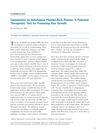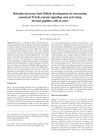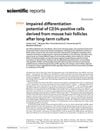
Female hair loss is often hereditary and can be treated with medication, hair transplants, and lasers.
 30 citations,
January 2014 in “Dermatologic Clinics”
30 citations,
January 2014 in “Dermatologic Clinics” Tight hairstyles, especially on chemically treated hair, can cause reversible hair loss if caught early but may become permanent if not addressed.
 13 citations,
July 2012 in “Dermatologic Surgery”
13 citations,
July 2012 in “Dermatologic Surgery” Platelet-rich plasma (PRP) may help promote hair growth and improve graft survival after hair transplantation, but more research is needed to confirm its effectiveness and determine the best dosage.

Eriocitrin and silymarin might be effective for hair loss treatment and need more research.
 47 citations,
April 2016 in “Lasers in Surgery and Medicine”
47 citations,
April 2016 in “Lasers in Surgery and Medicine” Low-level laser therapy may improve hair regrowth and thickness for androgenetic alopecia, but more research is needed.
 25 citations,
April 2018 in “Journal of Cosmetic Dermatology”
25 citations,
April 2018 in “Journal of Cosmetic Dermatology” PRP injections increase hair density and diameter in female androgenetic alopecia patients.
 178 citations,
April 2017 in “Journal of The American Academy of Dermatology”
178 citations,
April 2017 in “Journal of The American Academy of Dermatology” Minoxidil, finasteride, and low-level laser light therapy effectively treat hair loss.
 39 citations,
March 2018 in “Archives of Dermatological Research”
39 citations,
March 2018 in “Archives of Dermatological Research” Androgens may block hair growth signals, targeting this could treat hair loss.
 25 citations,
July 2017 in “Journal of Stomatology, Oral and Maxillofacial Surgery”
25 citations,
July 2017 in “Journal of Stomatology, Oral and Maxillofacial Surgery” PRP injections help regrow hair, reduce hair loss, and increase hair thickness, but effects decrease without ongoing treatment.
 3 citations,
March 2020 in “International Journal of Molecular Sciences”
3 citations,
March 2020 in “International Journal of Molecular Sciences” Thymosin β4 helps increase hair growth in Cashmere goats.
 August 2024 in “Scholars Journal of Applied Medical Sciences”
August 2024 in “Scholars Journal of Applied Medical Sciences” Combining PRP therapy with minoxidil is the most effective treatment for hair loss in men.
 November 2020 in “Bali Medical Journal”
November 2020 in “Bali Medical Journal” PRP may help hair growth in alopecia areata without major side effects, but more research is needed.
 July 2018 in “Elsevier eBooks”
July 2018 in “Elsevier eBooks” Stopping tight hairstyles can prevent and reduce traction alopecia.
 2 citations,
October 2020 in “Dermatologie pro praxi”
2 citations,
October 2020 in “Dermatologie pro praxi” Early diagnosis is crucial for treating alopecia effectively.
 23 citations,
January 2018 in “International Journal of Molecular Medicine”
23 citations,
January 2018 in “International Journal of Molecular Medicine” Baicalin helps hair growth by activating specific cell signals and pathways.
 1 citations,
January 2022 in “Open Access Macedonian Journal of Medical Sciences”
1 citations,
January 2022 in “Open Access Macedonian Journal of Medical Sciences” Both platelet-rich plasma and low-level laser therapy effectively treat hair loss with minimal side effects and good cost-benefit ratio.
 May 2023 in “Advancements in Homeopathic Research”
May 2023 in “Advancements in Homeopathic Research” Zauberöl® may help treat hair loss caused by testosterone in rats.
 10 citations,
March 2014 in “Scandinavian journal of clinical and laboratory investigation”
10 citations,
March 2014 in “Scandinavian journal of clinical and laboratory investigation” Malondialdehyde-modified DNA may trigger an immune response in alopecia areata patients.
 18 citations,
June 2017 in “Proceedings of the National Academy of Sciences of the United States of America”
18 citations,
June 2017 in “Proceedings of the National Academy of Sciences of the United States of America” A gene called Gk5 controls lipid production in the skin and affects hair growth.
 2 citations,
June 2022 in “Scientific reports”
2 citations,
June 2022 in “Scientific reports” Mouse hair follicle stem cells lose their ability to change into different cell types after being grown for a long time.
 42 citations,
February 2017 in “Scientific Reports”
42 citations,
February 2017 in “Scientific Reports” Researchers found a way to create cells from stem cells that act like human cells important for hair growth and could be used for hair regeneration treatments.
 41 citations,
July 2015 in “Current Drug Discovery Technologies”
41 citations,
July 2015 in “Current Drug Discovery Technologies” Some plants may help with hair growth and have fewer side effects than synthetic drugs, but more research is needed to confirm their effectiveness.
 3 citations,
July 2020 in “Synthetic and Systems Biotechnology”
3 citations,
July 2020 in “Synthetic and Systems Biotechnology” Scientists improved an enzyme to better produce a hair growth-promoting chemical from an immunosuppressant.
 26 citations,
August 2018 in “American Journal of Clinical Dermatology”
26 citations,
August 2018 in “American Journal of Clinical Dermatology” Hair loss in cancer patients can be related to the cancer itself, treatment, or other conditions, and understanding it is important for diagnosis and patient care.
 April 2017 in “Childhood Kidney Diseases”
April 2017 in “Childhood Kidney Diseases” Azathioprine can cause severe blood issues and hair loss, needing careful monitoring and possible discontinuation.
Current hair regeneration methods show promise but face challenges in maintaining cell effectiveness and creating the right environment for hair growth.
 110 citations,
July 2017 in “Immunology”
110 citations,
July 2017 in “Immunology” Skin's Regulatory T cells are crucial for maintaining skin health and could be targeted to treat immune-related skin diseases and cancer.
 1 citations,
September 2021 in “Skin appendage disorders”
1 citations,
September 2021 in “Skin appendage disorders” Botulinum toxin injections can help treat common hair loss in men, but more research is needed to confirm this and understand how it works.
14 citations,
January 2015 in “Annals of dermatology/Annals of Dermatology” Corticosteroid pulse therapy is more effective for severe alopecia areata than combination therapy.
 4 citations,
June 2022 in “BioMed Research International”
4 citations,
June 2022 in “BioMed Research International” Using mesenchymal stem cells or their exosomes is safe for COVID-19 patients and helps improve lung healing and oxygen levels.




























